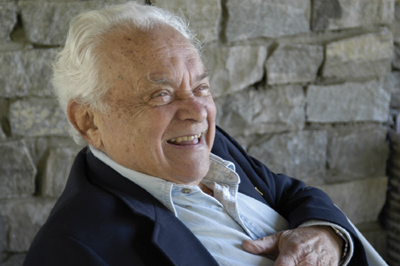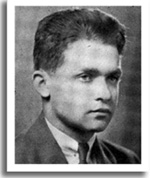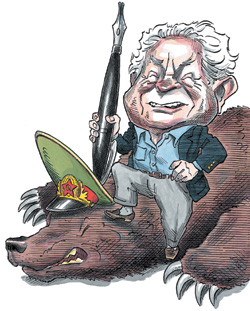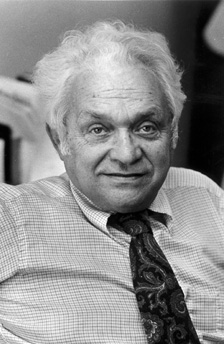|
|
 |
 |
 |
 |
|
FEATUREArnold Beichman ’34: Anti-Communist WarriorBy Margaret Hunt Gram ’05”We live in wondrous times.” Arnold Beichman ’34 is quoting Bismarck. But even if he weren’t apt to break into political and literary quotation every third minute, it is something he surely would say. In his 90 years, Beichman hasn’t lost his sense of awe. As seen through the eyes of this longtime journalist and fellow at the Hoover Institution at Stanford, the world is both horrifying and magnificent — in “a pretty precarious state,” but also a place of great joy and splendor.
Beichman, a native New Yorker, spent what most people would consider a full career in journalism. Then, at 50, he changed course, re-created himself and became an academic star. He received his M.A. in political science in 1967 and his Ph.D. in 1973, reliving the Columbia experience from a more seasoned perspective. “My greatest lesson,” he says, “is that everybody should go back to school when they’re about 50, because they’ll discover a world they did not know existed.” As one of the 20th century’s most influential anti-communists, Beichman spent most of the century fighting what he understood to be the most egregious risk to world freedom: the Soviet Union. At the same time, he was awed by other aspects of the world — poetry, academia, great minds, the United States and all the paradigms it has attempted to fulfill — and those sources of awe have motivated him through 90 productive years to a place among the United States’ influential intellectuals.
Arnold Beichman was born on May 17, 1913, on New York City’s Lower East Side. His parents had emigrated from a Ukrainian shtetl. In New York, the elder Beichman worked as a cotton goods peddler, speaking Yiddish, Russian, Polish, Ukrainian and Italian with his customers. Young Beichman read through the holdings of the local public library before matriculating at the College in 1931. In 1934, he succeeded his friend, Arthur Lelyveld ’33, as editor-in-chief of Spectator. With Hitler in power in Germany and tensions running high, Columbia’s Jewish Students’ Society held a dance that year in John Jay Hall to celebrate Purim. As soon as the lights went low, a group of fraternity members crept onto the balcony over the dance floor and threw down handfuls of Swastikas, shouting ‘Down with the Jews.’ After the offending students fled the scene, the adviser of the Jewish Students’ Society found Beichman and asked him to keep Spectator from publishing the story, saying it would be damaging to Jewish students on campus. Beichman recalls responding, “How can we not publish the story, which was seen by hundreds of people at a dance?” The story ran. Journalism works differently in the 21st century, Beichman notes, and today, Spectator would publish the story without question; there’s “more of an openness about knowledge and experience that was clearly quite concealed back then.” In 1932, Spectator’s editor, Reed Harris ’32, was expelled from the College after running a story critical of Columbia for spending extravagant amounts of money on football during the Depression. So Beichman’s decision was a brave one.
As an undergraduate, Beichman attended a student journalists’ conference in Washington, D.C., at the then-segregated Mayflower Hotel, where he led a group of northern students who threatened to pull out of the conference if black participants were not given due respect and apologies for poor treatment by some white southern conference-goers. Beichman’s initiative impressed a New York Times editor, who hired him to freelance for the newspaper after graduation. The freelance job quickly became a full-time position as a rewrite man at Newsday. Around this time, Beichman met young economist Milton Friedman, who would become a lifelong friend. “We started out by making a bet on the phony period of the Second World War,” Friedman remembers. “There was a period in late ’39 or early ’40 when there wasn’t very much action, and there was a widespread belief that this was a phony war and it was going to be over in six months. I made Arnold a bet that it would not be over in six months, and he made a bet that it would be.” They bet a quarter, Friedman says, “but a quarter was a lot of money in those days!” Beichman paid up, good-natured as always. “He’s a remarkable person,” Friedman says. “He’s full of energy; he’s an optimist, he always sees the bright side of things. He’s a wonderful companion.”
Then came a call that would shape Beichman’s future work and political obsession. Jimmy Wechsler ’35, who had succeeded Beichman as editor of Spectator and in 1941 was assistant labor editor at the New York daily PM, was the panicked voice on the other end of the line. Wechsler was concerned that the paper — an experiment in publishing without capitalist advertising — was being hijacked by a hoard of communists, who had been installed to the reporting staff by Dashiell Hammett, Lillian Hellman and Ralph Ingersoll. The paper needed more hard-headed American journalists, Wechsler told Beichman, to fight the reds. Beichman accepted an invitation to join the staff, taking his life-long position on the anti-communist side of the battlefield. He rose quickly to the position of city editor, publishing groundbreaking articles that included the first reports by an American journalist on the Warsaw ghetto uprising. When the Lelyvelds moved to New York at the end of World War II, they camped out in the Beichman apartment. Joseph Lelyveld, who was a small boy at the time, recalls the young Beichman as an energetic newspaperman with a crew cut — “an appealing guy.” When Lelyveld decided later that he wanted to become a journalist, he turned to Beichman for advice. The two “hatched a preposterous plot,” according to Lelyveld, for the dubiously qualified Lelyveld to apply for fellowships that would take him to Asia to report on current events. The mentorship shaped Lelyveld’s career, leading to his appointment as executive editor of The New York Times. PM finally fired Beichman in 1946, making him one of many casualties of the newspaper’s furious political battles. During the next 15 years, Beichman freelanced and worked under George Meany for the American Federation of Labor. “I wanted to undertake this fight against communism, which I thought was the most serious problem we had,” Beichman says. “So I went to work for trade unions, which I regarded — particularly the AFL — as the strongest fighters against it.” When the labor movement began to take a global perspective, Beichman also turned his attention to the international sphere. Driven in part by guilt over not having served in the military in World War II, he settled on freelance war reporting as suitable atonement. During the 1950s and ’60s, he reported on the Middle East and covered the national liberation struggles and wars in Algeria, Yemen, the Congo, Nigeria and Vietnam. “I wrote a piece for Newsweek that got the French very angry because I said they would lose [in Algeria],” he says. “They couldn’t win because they were not prepared to go all out like they [did] in WWII. It couldn’t be done on the cheap.” His understanding of the Algerian revolution gave Beichman a unique perspective from which to report on the war in Vietnam. In 1959, he interviewed South Vietnamese President Ngo Dinh Diem; in 1964, he wrote an article for the London Daily Telegraph arguing that the United States was unprepared for war and would be in Vietnam for at least 10 years. “I could see we were doing the same damn stupid thing that the French had,” Beichman says today. “We could have won in Vietnam, no question. In fact, I think if we’d hung around a couple more years, we might have. But we didn’t have the will we had in WWII, and if you don’t have the will, you’re not ready to make the sacrifice that’s entailed.” During those decades, Beichman began to make a transition between the world of journalism and an exciting New York intellectual scene, reinventing himself, as his friends describe it, in middle age. He became friendly with Irving Kristol and the Partisan Review gang as well as Lionel Trilling ’25 and a number of Columbia’s other leading lights, and kept up what friends described as a kind of salon in his New York home. All the time, he was coming up with new arguments against socialism and Soviet communism. “I believe there has been a global plebiscite against socialism,” he says now. “People want to escape. Nobody was fleeing to get into the Soviet Union, they were always trying to get out of the Soviet Union. And people would fly, crawl, swim, get on ships that were going to sink — anything to get away from what is called socialism. Now, why is that? … The popular plebiscite has been against socialism, by millions of people.” Why? “The control of wealth is the control over human life. So if a centrally planned economy decides how wealth is to be created and how it is to be distributed, then they really have a control over human life.” Centrally planned societies, Beichman says, are essentially fascist. “Even with computers, you can’t plan, because the human being does not allow himself to be planned. Today he smokes cigarettes; tomorrow he’s off cigarettes. How do you plan for that? Today he drinks vodka, tomorrow he drinks white wine. How do you plan for that? … It’s the open, the market society, that will determine what is made and what is sold and what is bought.” By the time he felt ready to return to academia, Beichman was 50. He enrolled in a Ph.D. program at Columbia. The decision expanded his intellectual and geographic horizons. “I had a wonderful time writing my dissertation,” he says. In order to research the British Conservative Party’s Research Department, he spent a semester in England. Without a salary, he supported his family, which included his wife, Carroll, and sons, Charles and John, by playing the stock market. “I was very lucky,” he recalls. “It was a boom market.” Upon leaving Britain, Beichman returned to his New York family, which had become an academic circus. “The kids went to their school, my wife went to her school, I went to my school,” he says. “There were nights when the whole house was quiet, because everybody was doing homework. My wife was prepping for the next day, my sons were doing their homework, and Daddy was doing his homework.” When Beichman finished course work for his graduate degree, the political science department handed him a list of 100 books for which his oral examiners would hold him responsible. “Take your time with them,” they told him, “and when you’re ready, you can come up for your oral history examination.” The University gave Beichman a small graduate student carrel on the top floor of Butler Library, and there he read for three months. “I came there in the mornings and I left at night,” he remembers. “My wife had to take care of the kids. I didn’t even go out for lunch; I’d lie on the floor and take a nap when my eyes gave out and I got sleepy. And I read for three months, 100 books. I took notes, I memorized, I reviewed, I reread.” The day of the oral exams came in Spring 1968. Beichman walked in prepared, but the panel of professors, interested in his opinion as a journalist, asked him why he thought the Soviet Union had invaded Czechoslovakia instead of quizzing him on his reading. “They never asked me a question about the books!” Beichman says, still indignant. “We talked for about two hours about questions like that. At the end of that, I said to the chairman of the department, ‘I sat there for three months reading the list of 100 books. I read them day and night, I studied them, I memorized them. And I didn’t get a single question during this oral exam! What’s the point?’ He said, ‘You read those 100 books like you’ll never, in the rest of your life, read a book that way again. You know those books.’ Isn’t that wonderful?” In retrospect, Beichman says, he learned to be a new kind of intellectual. “I learned how to read books in a way I hadn’t done before,” he says. “I underlined, I noted the key ideas. Normally, when you read a book, when you’re not reading it for an exam or something, you just read it. … But here, you’re actually looking for: What is the brilliant idea? What is the fighting idea? What is the idea that is basic? What is the key to this book? Is the key to Aristotle’s politics that man is a political animal? That’s a very important thing he’s saying! Why is he saying it? And then you read it!” Because he was preparing to be a professor of political science, Beichman says, it was important that he know those books; the reading that didn’t pay off in the orals would pay off in many years of professorships at the Universities of Massachusetts, British Columbia, Calgary and, as an adjunct, Georgetown. But mostly, Beichman’s degree enhanced the way he thought and interacted with the world. “A Ph.D. is the best thing you can get as a license for admission into higher society,” he says. “It’s a great opportunity to learn.” It would also help him write the five books that he has completed during his time in academia, including the warmly received Nine Lies About America (Library Press, 1972). “When my book came out, my colleagues said: ‘Geez, we know this, why didn’t we put it together?’” he says. “But the fact was, they didn’t know how. That’s what a university does: It organizes knowledge so that it has a comprehensible theoretical basis. It’s different from watching TV, where you go channel-hopping; Here, you have to focus on something.”
In much of his work, Beichman has focused on what he sees as the left’s misconceptions about the United States. He lists them off nonchalantly: “‘America is a fascist country — it’s reactionary.’ ‘What America needs is a violent revolution.’ ‘America means genocide.’” He marvels at an American faculty that extols these beliefs, building up what he calls “an indictment against American history.” “The last redoubt of Marxism is the American faculty,” he says. “In fact, Jean-Francois Ravel, the French philosopher, who is anti-Marxist, said that whenever they want to have a debate on Marxism in France, they have to get somebody from America, because the American universities are where the Marxists are, and [they] don’t have any in France.” Critical perspectives on the United States make Beichman “very indignant,” he says. “I think America is the greatest country in the world. Where else would a kid from the Lower East Side become editor of Spectator, then city editor of a New York newspaper? I don’t mean this as personal boasting, it’s just that the opportunity was there. And there are not very many other countries where this could happen.” In Beichman’s mind, there are no other universities, past or present, that have matched the mystique of Columbia under Nicholas Murray Butler (class of 1882), who was president during Beichman’s undergraduate years. “What ’68 did was to rob the University of the mystique that it had,” Beichman says. “And when an institution loses its mystique, it is very hard to achieve greatness. … I think it will be some time before Columbia recovers that mystique. But maybe it’s impossible to have a mystique like that anymore in the 21st century.” Butler Library is one of Beichman’s favorite Columbia buildings. “It is, of course, one of the great libraries of all time,” he says, adding that he has used the library in the past few years as he has worked on a biographies of Herman Wouk ’34 and Henry Wallace. “It’s a wonderful library, especially the oral history collection. That is one of the great treasures of any library in the world. It has 5,000 pages on Henry Wallace, and it’s indexed. And if you want to do something remarkable, go and look at the list of people whom it has oral historied, and you’ll be amazed at the amount of history that’s lying there, untouched by anybody.” “He’s the only 90-year-old I know who is ambitious,” says Peter Robinson, former speechwriter for President Ronald Reagan and a colleague of Beichman at Stanford’s Hoover Institution. He points out that Beichman is writing “what will be a marvelous biography of Wallace,” and that he churns out provocative newspaper columns every week. “He is twice my age,” Robinson says, “and twice as ambitious as I am.” In 1991, Beichman saw the Soviet Union collapse, bringing his life’s work to an apex. He wrote a column that year recommending that November 9, the day the Berlin Wall fell, be honored as a national holiday; in 2001, President George W. Bush followed up on the suggestion, to a certain extent, by dubbing November 9 World Freedom Day. Since 1982, Beichman has been a fellow at the Hoover Institution, where he has completed several books and written frequent columns, mostly on anti-communism, for the Washington Times, the Weekly Standard and many other publications. He spends his summers on a farm in Western Canada with his wife, showing up every year or so on the East Coast to visit friends or use Columbia’s oral histories. His friends and colleagues patently love him, and they are eager to relate stories of twice-weekly coffee dates and conversations about history, economics and literature. Beichman has made it a priority to mentor young journalists. Forbes reporter Robert Lenzner ’61 Business was the Boston Globe correspondent in New York during the early ’70s; he met Beichman there at a conference on student uprisings. Beichman leaned over to Lenzner during the conference and said he thought all the rebellious students “should be sent to Vermont without their granola.” Since that day, Beichman has guided Lenzner through personal and journalistic ups and downs — acting as a “Dutch uncle,” Lenzner says, to himself and Joseph Lelyveld. When he needs advice on a story or a good opinion on a current event, Lenzner says, “I call Arnold. I ask, ‘What do you think about this?’ I have to tell you: He’s hard-nosed. Matter of fact. Very tough-minded. Analytical. A lot of times he makes you feel like, I’m limp! I’m soft! He knows life.” For the past few years, Beichman has worked with a group of Stanford students on a right-wing newspaper, meeting once a week for a brown-bag lunch, imparting wisdom and uncompromising advice. “He’s been very important to them,” says Friedman, who has come to speak with the group. Beichman’s friends are bowled over by the sheer quantity of e-mail he sends — “He spends about 10 times as much time on the Internet swapping messages with people and sending articles to them as I do,” marvels Lelyveld, impressed by Beichman’s constant energy. Asked if he was tired an hour into a recent phone conversation, Beichman roared, “Tired? I’ve just begun to fight!” Lenzner stresses that he’s relying on Beichman to continue the fight. “I would like it if he would live forever, certainly until he’s 100,” Lenzner says. “There isn’t anything I wouldn’t do for him. And you know something? I often think, when I feel some despair, I think, look at Arnold! He’s 90 years old! And that head of his is going, that heart of his is going and he is alive, he is engaged.” Margaret Hunt Gram '05, who is from Los Angeles, studies English and Comparative Literature and writes for the Columbia Daily Spectator. This is her first contribution to Columbia College Today.
|
|
||||||||||||||||||||||||||||||||||||||||||||||||||||||||||||||||||||||||||



